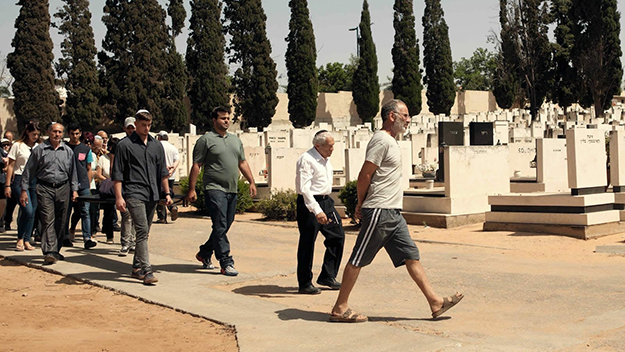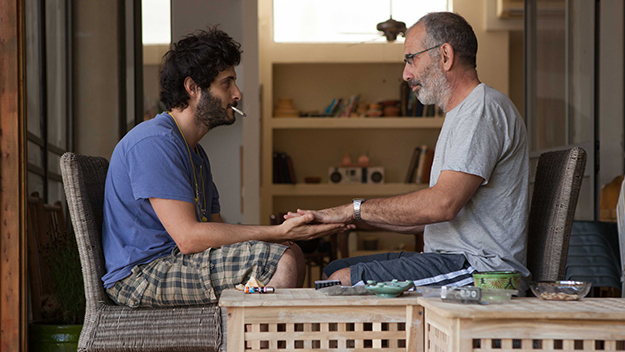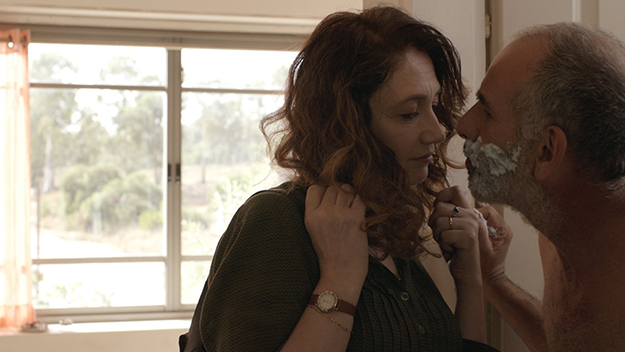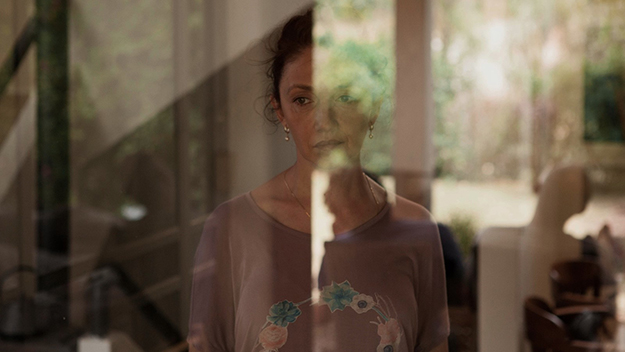Deep Focus: One Week and a Day

Asaph Polonsky’s One Week and a Day is a surprising Israeli comedy about grief. It’s wry, irreverent, rueful, silly, and stunningly cathartic. Polonsky’s debut feature may be slender, but it boasts a smart, compelling take on the selfishness of misery and an unsentimental view of the way out of it. The movie marries chuckles to shocks of recognition.
Polonsky introduces his antihero, Eyal Spivak (Shai Avivi), at the end of the weeklong Jewish mourning period, or shiva, for his 25-year-old son Ronnie, who died after a long illness (cancer, we presume). Avivi, an Israeli comedy star, has frequently been compared to Larry David, and at first the film plays like a riff on Curb Your Enthusiasm—Denying Your Grief. Eyal marks the climactic day of his son’s shiva by whupping a young boy at ping pong rather than communing with his wife, Vicky (Evgenia Dodina), or the adults who’ve come to sit with them. The detested couple next door, Shmulik Zooler (Sharon Alexander) and his wife Keren (Carmit Mesilati Kaplan), appear after everyone else has gone and the shiva is officially over. Eyal tries to hide from them in the backyard and traps them on a patio before Vicky lets them, along with their cucumber salad, into the house. The most Eyal will say to them is, “I don’t eat cucumbers.”
Even when you sympathize with Eyal’s disdain, Avivi fearlessly portrays him as a man using sorrow as a license for self-absorption and a willful reversion to childhood. He takes glee in beating that tyke at table tennis (expressing no regret for paddling the ball into his tiny competitor’s eye); he rakes his fingers through pastry boxes in search of just the right goodie. After the visitors disperse and Vicky prepares to visit their son’s grave, Eyal tries to wheedle his way out of it. He should stay in the house, he tells Vicky, because thieves target mourning families and pounce when they go to the cemetery. A minute or two later, after saying he’ll just clean himself up, Eyal ambles down an alley to a taxi like an undercover agent dodging enemy spies. He’s determined to retrieve the multicolored blanket he forgot to take home when Ronnie died in hospice.

That’s when Avivi’s performance begins to take hold. A bright-eyed little girl who’s keeping her dying mom company greets him warmly and notes that he’s gained weight. (She later describes him as the father of her best friend, Ronnie.) Her simplicity leaves him nonplussed. When Eyal enters his son’s old hospice room, now occupied by another terminally ill young man, he can’t resist investigating what’s left on the lunch tray. But Avivi gradually conveys Eyal’s covert agony. Eyal communicates with the mute sick man in an awkward hush; he knows he’s invading this ailing human’s space. Before Eyal leaves, he asks if he can get the patient anything, like yogurt. The detail stings because it evokes how well the bereaved father has come to know this penultimate resting place. The pale fellow breathing weakly with an oxygen mask can’t give Eyal a clue about the missing bed cover. Instead, with a finger as expressive as that of Michelangelo’s God giving life to Adam, he points to a drawer containing Ronnie’s final, untouched batch of medical marijuana. Eyal views it as an inheritance. He doesn’t expect to find bliss in a baggie, but at this point he’s desperate for emotional pain relief. To master the mechanics of smoking pot, he enlists the neighbors’ slacker-stoner son, known only as Zooler (Tomer Kapon), who works as a sushi-joint delivery boy when he’s not practicing air guitar.
Will Eyal, who’s never taken a toke in his life, ever be able to roll a joint—or inhale one? Will he remember to reserve the plots next to his son’s grave for Vicky and himself, before the no-nonsense cemetery manager fills them? (The funeral business in Israel, alas, is booming.) How will Shmulik Zooler react to Eyal slapping—yes, slapping—his wife Keren, or palling around with his son Zooler? How much misbehavior can Vicky take before she does something drastic?
Polonsky builds his narrative around the small disturbances of men and women. Dodina is phenomenal as Vicky. Unlike her husband, she rarely loses control. She masters social forms and sees through them; she understands Eyal’s outbursts of anarchy and sees through them, too. An elementary school teacher, she returns to class immediately after shiva and before anyone expects her to (another source of bitter comedy). She’s an authority figure even to herself. But Dodina imbues Vicky with singular and wary warmth. It’s hard to know what’s more moving—her shedding of one tear or her reflexive move to wipe it away before anybody notices. Dodina is never just a straight woman, and Avivi is never just the crazy comic.

Polonsky and Avivi take us through each coil in Eyal’s psyche without shortcuts or cheating. We come to understand why Eyal acts like a jerk with the elder Zoolers. They dropped him and Vicky when Ronnie got sick; so it’s not surprising that their own boy doesn’t even know what a hospice is. Stepping into Ronnie’s bedroom, amid his son’s CDs and bass violin, Eyal realizes that Ronnie must have heard the Zoolers wail and groan during their lovemaking—and that fact becomes unbearable. But Eyal grows fond of their goofy, empathetic son. Zooler and Ronnie were friends—Eyal once recorded them mimicking Paul Simon and Chevy Chase’s “You Can Call Me Al” video. Then it hit Zooler that it wasn’t cool for a ninth-grader like him to be buddies with a sixth-grader like Ronnie.
When Zooler does a squiggly dance-like walk en route to a pot session on the patio, Kapon is as loose-limbed and bright-eyed as the young Jack Lemmon. Happily, his air-guitar set piece is more than slapstick relief. It leads to the film’s first transcendent sequence: Eyal and Zooler performing “air surgery” with Ronnie’s sprite-like chum at the hospice, on her mom. It’s the first sign we have that Eyal can see beyond his own private sorrow. Eyal has clung to the hope of finding Ronnie’s cover of many colors as if it were a covenant with his son, like the coat of many colors Jacob gave to Joseph. Now, though, he lets it go. In a gentle, subtle moment, he perceives that the girl has appropriated it for her mother. With a brush of his hand he seems to bless it.
The result of all these deft, small touches is equally traditional and original—an observational tragi-farce built more like an episode of Seinfeld than Curb Your Enthusiasm. Each arbitrary tic of character or wayward strand of plot comes together in a crazy quilt of a narrative. But it isn’t “about nothing.” It’s about Eyal learning to shoulder his pain and become a genuine adult all over again. Rampaging through his son’s cemetery with Zooler and the little girl in tow, Eyal runs into the burial service of the woman who will take the plot next to Ronnie’s. Suddenly, the movie changes. The simple gravity of the rabbi leading Kaddish stops Eyal in his tracks. The plainspoken eloquence of the woman’s older brother (played magnificently by Uri Gavriel) transfixes Eyal and his friends. It’s as if they finally comprehend, “This is what a man in grief can do—express his love and fix his vision of the departed in every listener’s memory.”

In his use of domestic architecture and modern landscapes, Polonsky has learned a thing or two from Jacques Tati, and in his attention to even the most casual gestures of his actors, he resembles American directors like Paul Mazursky and Barry Levinson. His willingness to go beyond the humor of indignity—to go for the human comedy that lives beyond the cringe—is what marks him as a moviemaker to watch.
As the eulogy goes on, Polonsky shows the mourner the day before the funeral, striving to conduct himself with grace even when he’s scraping bird droppings from his windshield. Is this what Eyal sees in his own head, or what the director thinks really happened? Either way, the movie takes a daring, Joycean leap. And Polonsky sticks the landing.
Michael Sragow is a contributing editor to Film Comment and writes its Deep Focus column. He is a member of the National Society of Film Critics and the Los Angeles Film Critics Association. He also curates “The Moviegoer” at the Library of America website.







